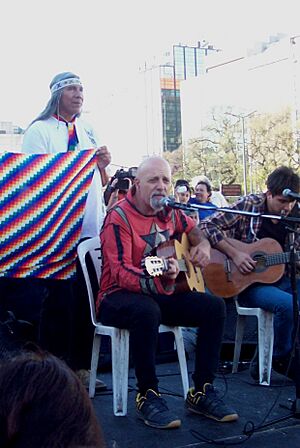Qopiwini facts for kids
Qopiwini Lafwetes (pronounced Qo-pee-wee-nee Lah-fweh-tes) is a special group of indigenous communities in the Formosa Province of Argentina. It brings together people from four different native groups: the Qom, Pilagá, Wichi, and Nivaclé. This group was formed in early 2015 to speak up for their rights and traditions.
In February 2015, members of Qopiwini set up a protest camp in Buenos Aires to get attention for how the government of Formosa was treating indigenous people. They wanted to gather signatures from citizens who supported their cause. About 40 representatives from 46 different Qom, Pilagá, Wichi, and Nivaclé communities joined the camp. The main leader of Qopiwini is Félix Díaz, who is a spokesperson for the Qom Potae Napocna Navogoh community. However, important decisions for the group are made together in meetings.
Contents
Why Qopiwini Was Formed
Indigenous peoples in Formosa had faced many challenges for a long time. In 2010, some native people protested on a main road because they were being forced off their traditional lands. The police responded with violence, and two native people died, with others getting hurt. After this, Félix Díaz started organizing meetings for native communities in Formosa between 2014 and 2015. He worked with other leaders to teach people about their rights as native peoples in Argentina. They held five meetings in different places, which helped people feel stronger about defending their rights.
Protests and Demands
In January 2015, members of the Poate Napocna Navogoh community again blocked a main road. They demanded an end to violence and neglect in their community. They also wanted to know about building projects like houses, hospitals, and roads that had started in their area. They asked when these projects would be finished and how they would be shared.
Amnesty International, a group that works for human rights, said that the road block was because the people were "claiming their rights and promises unfulfilled by the government." Amnesty International also said that the violence from 2010 "must not happen again." They asked the government to follow a court order from 2011 that required the protection of the Qom people.
Important Meetings and Summits
The Consciencia Solidaria NGO, another human rights group, was at a meeting in Cacique Colorado. Here, people started talking about forming a new group called Qopiwini. After this meeting, they planned another big meeting for March 2015 in Félix Díaz's community, but it didn't happen.
From May 27 to 29, 2015, Qopiwini organized the First National Summit of Native Peoples in Buenos Aires. About 100 leaders and representatives from 25 native communities across 17 provinces attended. They talked about human rights and how people had resisted difficult times, including the time of the civic-military dictatorship in Argentina. Representatives shared their experiences and challenges. On the last day, they announced their plans for the future. Members from the Confederation of Native Nationalities of Ecuador (CONAIE) and other human rights groups were also there. After the summit, many ethnic leaders marched through the streets of Buenos Aires. They were joined by Adolfo Pérez Esquivel, who won the Nobel Peace Prize, and Pablo Pimental from the Permanent Assembly for Human Rights. A small group tried to deliver a petition to the government house, but after waiting a long time, the government refused to meet them.
Qopiwini's Formation and Buenos Aires Camp
Because the government of Formosa didn't respond to their concerns, Félix Díaz decided to return to Buenos Aires. In 2010, he had set up a camp at the intersection of 9th of July Avenue and May Avenue. After five months at the camp, some talks happened, but they didn't lead to much change. The Argentine National Gendarmerie, along with some political activists, eventually removed them from the camp. Díaz stated that none of the agreements made during earlier talks had been kept in four years.
Community Meetings Leading to Unity
In 2014, several important meetings took place in different communities:
- May 30-31 in Las Lomitas
- July 18-19 in Bartolomé de la Casas
- November 14-15 in Laguna Yema
- December 5-6 in the Nanqom neighborhood of Formosa city
Many communities participated in these meetings, including: Pilagá El Perdido, La Linea, El Simbolar, Wichi Community of Isla Colón and Saint Martín, Qom community Bartolome de las Casas, Qom community Potae Napocna Navogoh, Pilagá community Rincon Bomba, Oñaidee, Laq Fasanyie, Nivaclé Community of Río Muerto, Wichí community Pozo del Mortero, Mission Laishi and Nanqom, Wichi community Tres Pozos Bazan, Qom community Mission Tacaglé, Wichi community Lagoon Yema, Rafael Justo, Pilagá Federation, Wichi community El Potrillo, and Wichi community Las Bolivianas.
Between January 23 and 24, 2015, a key meeting happened in the Wichi community of Colorado, in Formosa province. It was here that the Organization of the Native Peoples, Qopiwini Lafwetes, was officially founded. After many discussions and hard work, the different native groups in Formosa province finally achieved unity.
Camp Dismantled and Meeting with President
After a press conference, it was announced that the protest camp in Buenos Aires would be taken down on Sunday, December 6, 2015. This decision came after Mauricio Macri won the presidential elections on December 1. Félix Díaz was able to have a meeting with the new Secretary of Human Rights, Claudio Avruj. Avruj confirmed that the new government would listen to the requests of indigenous peoples. Another reason the camp was dismantled was fear of attacks.
On December 17, 2015, President Macri met with Félix Díaz.
See also
 In Spanish: Qopiwini para niños
In Spanish: Qopiwini para niños


